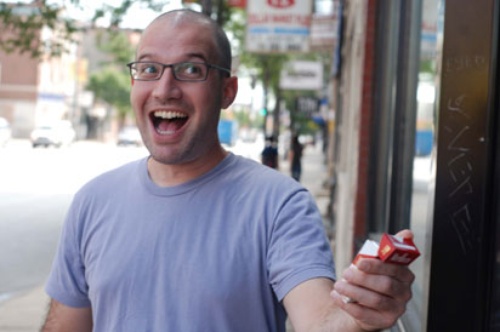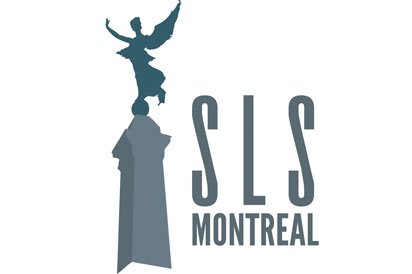
The SLS Interviews: Adam Levin
The Instructions author on Playboy, Salinger and defending Nazis.
Adam Levin is the author of the novel The Instructions, a finalist for the 2010 National Jewish Book Award for Fiction, and winner of both the 2011 New York Public Library Young Lions Fiction Award and Indie Booksellers Choice Award. Hot Pink, his collection of short stories, will be published by McSweeney's in the spring of 2012. He lives in Chicago, where he teaches Creative Writing at the School of the Art Institute. Levin was also the 2003 winner of the SLS St. Petersburg Fiction Award.
Sophie Naima Caird was one of the original readers of The Instructions. She lives in Montreal, where she works as a freelance writer, and she was an SLS St. Petersburg participant in 2006.
Their conversation took place over Skype.
Sophie Naima Caird: If someone were to ask if The Instructions is autobiographical in any way, would it be as wrong as someone asking the makers of Free Willy if it's a documentary? How much of your fiction is rooted in reality?
Adam Levin: It's mostly a projection. I mean, when I was a kid I wanted to be the messiah and thought it was possible. I wasn't a billionth as smart as Gurion but I liked to get in fights and I liked to read a lot and I think that some of the kids I was friends were smart kids in conventional ways. Some of them were smart in non-conventional ways or were good at fighting but nowhere near to the extent that they are in the book.
There's no event in there that resembles anything in my life. But definitely a lot of it was stuff that I thought about a lot. In junior high school and high school, I was sort of obsessed with the idea of loyalty and what it meant, and I think the book is pretty into that. I don't know if that's how all boys are, but the boys I hung out with, that was the thing.
SNC: The book went from 1,500 pages to 1,000. What did the editing process change and leave behind?
AL: There were a couple major changes. When I handed it in it had this really obnoxious meta frame to it. We revised it for, like, eighteen months. A lot of stuff changed and it was all about tightening the plot up—getting rid of the excess and enhancing the plot points.
SNC: Do you like the editing process?
AL: Yes and no. Working with Eli [Horowitz] is amazing. He's one of the three best readers I've ever had. Him, George Saunders and my friend Christian Tebordo. They were just so on. So in one sense I really like it and in another I fucking hate it because I keep seeing what's shitty and I have to deal with it. I feel like it's necessary, and ultimately I'm always happy when it's done. I'm happy not just because it's done, but because something was accomplished, and I feel like that's where a lot of work is. I'm pretty compulsive myself; probably on any given day I ditch at least 50 per cent of what I wrote by the end of it. Or like 80 or 90 [per cent]. I feel like if we didn't go through the book how we did, I wouldn't feel right about it. Every decision in there is deliberate.
SNC: Do you feel like it's necessary to have people read [your work] in order to determine if it's any good? Or do you have a pretty good sense of what's what?
AL: It's necessary to have people read it; critique is a worthwhile thing from certain people. My policy is [to] get a thing to the absolute best place I can get it without any outside influence. Then you can see what works and what doesn't based on a few key readers. Those readers are pretty well culled by now. I'm writing for readers, and I'm writing for people to hopefully fall in love with what I made. So it's definitely important what readers think but as part of the process of making the thing, [but] it comes really late for me.
SNC: Are the stories in your new short story collection, Hot Pink, old or new?
AL: Some of them are older and some of them I've written in the past year or so. The older ones are pretty much going to stay as they were when they were originally published, but a couple of them are drastically different. It's interesting—it's not that interesting—but the first story I ever published is going to be in the collection. I looked at it with Eli and it was all fucked up. I think I worked on that for a month solid, just fixing it up. It's hard to even think of it as the same story. It was like this voicey fat kid narrating and now it's a voicey fat kid with some issues.
SNC: Do you want to keep writing fiction? Would you ever try writing something else?
AL: I definitely want to keep writing fiction. I'm sort of tempted—I had lunch with Hugh Hefner's second-in-command, and they wanted me to write for Playboy. And I was like, That's going to be sweet. They used to publish really awesome stuff—Nabokov published in Playboy. But they were asking me to pitch them some non-fiction, and I thought, Man, I really want to do that but I've never really written non-fiction and I really want to write fiction. So I'm thinking about it. I'm letting everything be open until I get the collection done. The danger with the non-fiction thing, of course, is that there's actually money in that and so there's probably a larger temptation to keep doing that—so part of me is afraid I'll like it enough to ditch fiction.
SNC: The children's dynamic in The Instructions reminded me a bit of a modern, power-drunk Glass family. Thoughts?
AL: I read Salinger up and down and I still do, so that's not surprising, but I wasn't thinking about the Glass family. The thing about the Glass work, especially Franny and Zooey is there's a huge intimacy when you're reading them. Especially Zooey with that seven-page shaving scene, but it's good. I think with Salinger, and with Wallace too when he's at his best like in Infinite Jest, people are watching one another behave in a way that should be dull and it's not. The characters are fascinated with one another and I think that maybe that's something I was going for.
SNC: In The Instructions, which character has the soundest moral compass?
AL: I would say Gurion's father. I think Gurion's father is consistently right. There isn't really anything he does that you can't understand or get behind while Gurion is constantly skating the edge and often you're behind him, and then he takes something a little too far but his father seems like a pretty balanced guy. And I think Eliyahu starts out that way too. He's a little soft but in a good way. So I would say those two. In terms of a moral compass, they're all kind of obsessed with what is right and what is wrong but I think it's a question of whose version is more reasonable and more liveable. I think that's Gurion's dad, unless you think it's too outlandish to defend a Nazi.
SNC: I feel like, coming from a literature background, it's hard to write without trying to figure out what it's about. But I don't think that's a good way to treat a piece of fiction.
AL: Absolutely. I agree, and I think that's the impulse to beat down. I think ultimately that if you have a story or a novel that you can sum up sufficiently, it fails. The thing needs to be something that needs to be read in order to be understood.
You've got to figure out what is good to obsess about in advance, what aesthetic qualities you want to honour before the internal qualities, the actual process you want to honour. The stuff you write about when you're inspired is usually schmaltzy. You look back and it's sloppy and usually a little sentimental I think, for most writers I know at least. It's a matter of making the feeling you had come across, which never comes across the way it's initially conceived.
I always think of writing like it's flirting. When you meet someone and you're really attracted to them you're not like, I'm so fucking attracted to you! That's disgusting, that's off-putting. You want that feeling to be contagious. You want the other person to feel that for you. And so you figure out basically how to manipulate them into feeling that way for you, and I think that's what writing is. So you're like, I want to kill this character and I want it to break hearts, right? You can't write it in the way you initially conceived it because otherwise it will be like, This person is just trying to break my fucking heart.
SNC: You can't sum up anything good in one sentence.
AL: I'm one of those people who never uses an outline. I know writers who profit from using outlines but for me that kills it because I get involved with the aboutness of it. And then I think, What is this thing going to mean? So I think if you can trust a process of "I need to make this work sentence-to-sentence and this sentence-to-sentence thing needs to add up to some whole by the time I have a paragraph break or whatever measure," then that's a way to dodge that aboutness. That's a way to get away from feeling like you're writing a thesis. Does that make sense?
SNC: Totally.
AL: Mary Gaitskill is all about image, and from what I've heard from her, she starts with an image and goes on. I usually start with a sentence and go on but she has some image she wants to chase and then it's what develops from that image. And my sense is that if you sat down and actually were able to convey that image that you just described in a way that is satisfying to you, then you would know where to go next. Maybe not that day, but maybe the next day. You'd wake up and you'd read it [and know]: these are the questions, this is what I want to see happen.
As part of Montreal's Summer Literary Seminars, Adam Levin will be reading with Katrina Best and Steve Almond on Friday, June 17 at Concordia University's De Seve Hall at 7:30 p.m.
Montreal’s Summer Literary Seminars take place from June 12 to June 25, 2011. For a schedule of events, or to buy a pass, visit www.sumlitsem.org/montreal/schedule.html.
Related on maisonneuve.org:
—The SLS Interviews: Miguel Syjuco
—The SLS Interviews: Lynne Tillman
—The SLS Interviews: Johanna Skibsrud
Subscribe — Follow Maisy on Twitter — Like Maisy on Facebook






